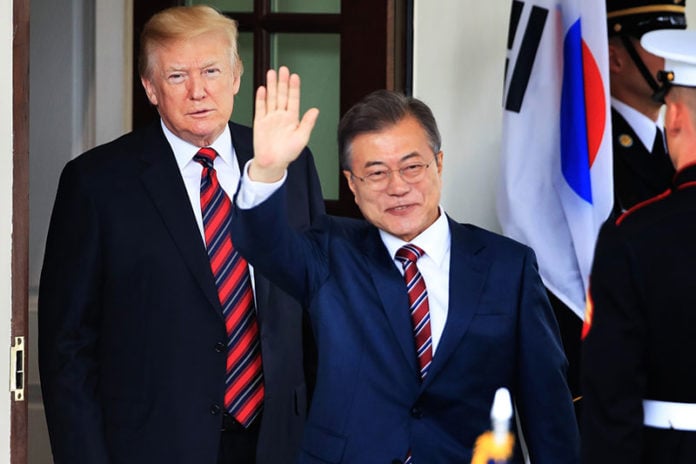It may not be too late to hope for peace in our time.
South Korean president Moon Jae-in said yesterday that more impromptu talks with Kim Jong Un are a possibility. And US officials are reportedly looking to revive the Singapore summit with North Korea.
Moon Jae-in and Kim Jong Un met again on Saturday at the border village of Panmunjom. Then Moon Jae-in held a news conference on Sunday, explaining that he wanted the US-North Korea summit to become a US-North Korea-South Korea summit, with three way talks between all parties.
Although Donald Trump had declared the June 12th summit to be canceled, due to Kim Jong Un’s bad behavior, it seems the Koreans still want to talk. Moon Jae-in said that, at their surprise meeting on Saturday, Kim Jong Un had reinstated his commitment to the “complete” denuclearization of the Korean peninsula.
That alone is astounding, and almost certainly a ploy on the part of Kim. The nukes have always been the North Korean government’s only assurance of survival. Nobody has ever believed that Kim was ready to fully surrender his nuclear weapons.
Moon Jae-in confirmed that the North Korean leader does have reservations about giving up his bombs: “What Kim is unclear about is that he has concerns about whether his country can surely trust the US over its promise to end hostile relations and provide a security guarantee if they do denuclearization”.
Pyongyang has been saying for years that they want a “denuclearization” of the Korean peninsula, but they’ve never been specific about what that means. To what degree they want to give up their own weapons, and what they will want in exchange, are unknown.
But the North Koreans have sent top diplomatic officials, including the vice chairman of the Workers Party Central Committee, Kim Yong Chol, to the US and Singapore to restart the negotioations. And the US has sent its own officials and diplomats to Singapore in response. It seems that planning for the summit is moving ahead, as Trump suggested it might, despite the cancellation last week.
Speculation by Western policy experts seems lean towards the idea that Kim Jong Un will want the US to remove troops or other strategic assets from South Korea in exchange for any nuclear promises. But “denuclearization” does not mean “disarmament.”
Kim Jong Un may never be willing to surrender his nuclear weapons. He may be willing to adopt a less aggressive posture towards the South, sign a treaty saying the Korean War is officially over, and accept some food aid in exchange for a few minor diplomatic concessions.
(This is probably what Moon Jae-in wants out of the deal, and the reason he’s trying to insert himself into the negotiations.)
But trouble will almost surely arise, because what the US wants and what North Korea wants are going to be very different things. The US wants a destabilizing influence in Asia to step down its military arsenal and stop making such a fuss.
North Korea (manifested in the person of Kim Jong Un, for the North Korean state and the Kim dynasty are inseparable as far as we know) wants to ensure its own survival.
It is possible that Kim Jong Un is looking for Korean reunification and a brighter future for his people by liberalizing his economy and opening his society up. Or he may just be looking to buy time until his nuclear program, likely derailed by the Punggye-ri collapse, can produce enough weapons to hold off the US indefinitely.
Either way, Kim Jong Un has surely studied the example of other iron-fisted dictators, like Moammar Qaddafi or Saddam Hussein, who gave up their weapons of mass destruction in exchange for American promises of safety.
He could ask those men how that decision played out for them.
If any of them were still alive.




























